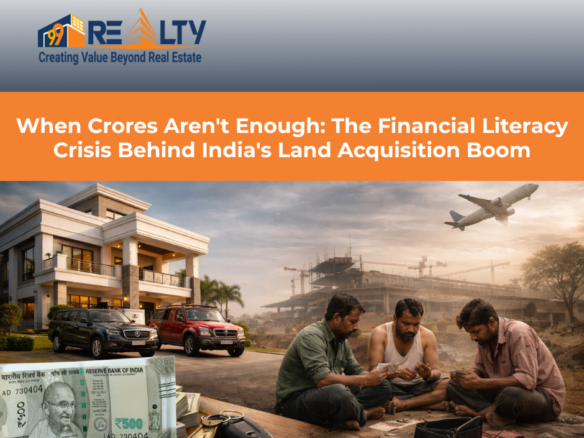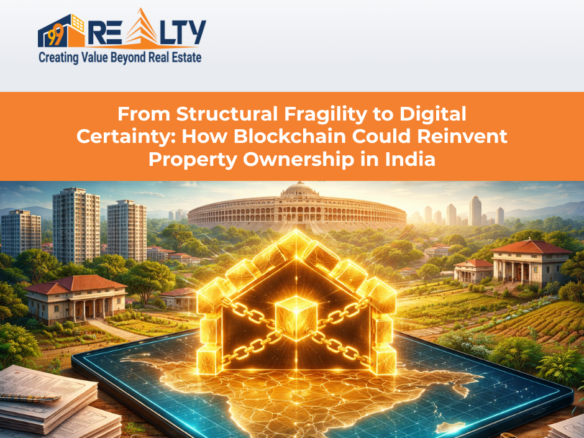Let’s face it — real estate isn’t flashy. It doesn’t buzz like crypto, doesn’t spike like stocks, and doesn’t trend on social media like drop shipping. But here’s the kicker: it silently creates millionaires. In fact, most of the world’s richest people either built their wealth from property or parked their profits into real estate. Welcome to the slow, steady, and surprisingly satisfying world of real estate — where boring equals brilliant.
Is Real Estate a Good Investment in India? A 2025 Complete Guide
Why Real Estate Seems Dull to Many
Let’s be honest — when you picture an exciting career, real estate doesn’t exactly scream “thrill.” There are no lab coats, no billion-dollar IPOs, no flashing green and red graphs that make your heart race. It doesn’t offer the drama of the stock market or the instant gratification of a viral startup. Instead, it’s a world of paperwork, lengthy legalities, zoning codes, delayed approvals, and site visits in the scorching sun.
Sound boring? Maybe to some. But beneath that monotonous surface lies a slow-moving financial powerhouse.
The truth is, real estate is more about routine than rollercoasters. It doesn’t require you to constantly chase trends or stay glued to a screen. It’s about discipline, vision, and patience — traits that may not attract the spotlight but do build real, lasting wealth.
And here’s the paradox: the very reasons it seems boring are what make it dependable. Unlike fast-moving professions that can burn out overnight, real estate’s pace is steady. Projects take time. Investments mature over years. You don’t flip a switch and become rich — you build wealth, brick by brick, deal by deal.
Young professionals often overlook it because it doesn’t feel “cool.” In a social media world obsessed with speed and flash, real estate feels analog. But ask around, and you’ll notice something interesting — many of the “boring” people in real estate are quietly living in penthouses, driving luxury cars, and retiring early. They didn’t go viral, they didn’t chase unicorn valuations. They just made smart choices… and waited.
Everyone’s chasing the next big startup or crypto moonshot. Real estate? It’s more of a marathon. But hey, marathons win races too — especially the wealth ones.
Real Estate IPOs in 2025 – What You Need to Know
The Hidden Power of Real Estate Investments
Compound Growth Over Years
The magic of real estate lies in compounding. Let’s say you bought a ₹50 lakh property in 2013. In 2023, it could be worth ₹1.25 crore. That’s not overnight magic — that’s disciplined growth, the kind that builds generational wealth.
Cash Flow, Appreciation, and Tax Benefits
Few investments offer you rent (monthly income), appreciation (long-term growth), and tax write-offs (bonus!). Real estate bundles all three.
Real Estate vs. Other Assets: A Side-by-Side
Cars, Gadgets & Even Stocks — Depreciate or Volatile
Let’s break it down:
- Cars? Lose value the moment you buy them.
- Tech gadgets? Outdated within 6-12 months.
- Stocks? Potentially great but also nerve-wracking — up today, down tomorrow, after 10 years it may exist or not.
Real Estate: A Tangible, Evergreen Asset
Now, let’s talk about what makes real estate so powerful, yet so underappreciated — it’s real. Tangible. Concrete. Literally.
In a world that’s increasingly digital — from cryptocurrencies to NFTs and metaverse land — real estate stands firm as the original investment you can see, touch, walk on, or even live in. That physicality creates something that’s emotionally and financially reassuring. You know it’s there. It’s not disappearing with a server crash or a tweet.
It’s also evergreen because of one fundamental economic rule: people always need space. Think about it — whether it’s for living, working, shopping, storing, manufacturing, or relaxing — the demand for property doesn’t vanish. Sure, cities evolve, technology changes, remote work shifts preferences. But the need for land and buildings remains timeless.
Real estate is also flexible. You can renovate it, repurpose it, lease it, or even divide it. A single asset can become multiple income sources. A building that once housed a textile unit could be turned into a co-working space. A farmland could evolve into a resort. Your house could earn passive income via Airbnb. Try doing that with stocks.
Let’s not forget the psychological value either. Owning property brings a sense of security — a fallback in tough times. When everything else crashes, your home or plot still holds intrinsic value. And even if the market dips for a while, real estate rarely becomes worthless. In fact, with time and care, it tends to appreciate — more on that in the next sections.
Plus, there’s this underrated aspect: real estate encourages long-term thinking. You don’t buy a house today and sell it tomorrow. You plan. You research. You look at growth corridors, school zones, transit plans. That mindset alone separates short-term speculators from serious wealth builders.
In short, real estate might not be as thrilling as day-trading, but it’s way more forgiving. It rewards those who understand its value, who’re willing to play the long game, and who don’t mind a little boredom in exchange for long-term gain.
Avoid These Real Estate Trap Zones in India Now
Real People, Real Riches: Case Studies That Inspire
Vivek Oberoi: From Silver Screen to Skyscrapers
Vivek Oberoi successfully pivoted into the world of real estate, becoming a serious player in the industry—not just a celebrity face.
After early success in Company and Saathiya, Vivek Oberoi’s Bollywood journey hit a pause. Instead of chasing fading fame, he pivoted to real estate, co-founding Karrm Infrastructure for affordable housing and later becoming a driving force behind BNW Developments, a luxury, sustainable housing venture. Far from being a passive partner, Vivek is deeply involved in strategy and execution. Today, he’s seen not just as a celebrity, but as a serious real estate entrepreneur — building communities, lifestyle spaces, and a second innings that’s arguably more impactful than his film career.
Rakesh Jhunjhunwala: The King of Stocks and Believer in Realty
Rakesh Jhunjhunwala, the legendary investor of Dalal Street, was known for his stock market brilliance — but few know he also believed deeply in real estate. While stocks brought him excitement and immense wealth, he often said real estate gave him “tension-free” peace of mind.
He made strategic investments in premium properties across Mumbai and Pune, including a record-breaking purchase of a 2.5-acre bungalow plot in Malabar Hill for ₹371 crore — not just a home, but a long-term legacy asset.
For Jhunjhunwala, real estate wasn’t about luxury alone. He appreciated the passive rental income, land appreciation, and the emotional security of holding tangible assets. His philosophy was clear: stocks made him rich, but real estate helped him stay grounded.
Even India’s most iconic risk-taker valued the stability and balance real estate brought to his portfolio.
Donald Trump: Building an Empire on Land
Regardless of politics, Trump started with property. From Manhattan towers to global resorts, real estate formed the bedrock of his empire.
Shah Rukh Khan: Mannat is More Than Just a House
SRK’s iconic home, Mannat, is now worth over ₹200 crores. Bought years ago, it stands today as a symbol of value appreciation — and a Mumbai landmark.
Akshay Kumar: From Actor to Real Estate Mogul
Akshay’s not just a superstar — he’s a silent investor in properties across Mumbai, Goa, and even international markets. Rental yields and capital appreciation keep his fortune growing.
Warren Buffett’s Real Estate Holdings
The Oracle of Omaha famously lives in a modest house, but Berkshire Hathaway invests in commercial real estate through various channels. Even he trusts the long game.
Why Smart Investors Always Bet on Property
Limited Supply, Ever-Growing Demand
Unlike stocks, land is finite. As population and infrastructure grow, demand for real estate only intensifies.
Inflation’s Friend: Real Estate Appreciates
When inflation rises, so does the value of property and rent. Your home becomes a natural hedge.
Debunking the Myth: Real Estate is High-Risk, 99 Realty’s Observation
Location, Research, and Patience — The Magic Trio
Sure, buying blindly is risky. But if you research the area, check zoning laws, and think long-term — your investment becomes incredibly solid.
Why Patience Pays in Real Estate
People who held onto land in the outskirts of Pune, Gurugram or Bengaluru 15-20 years ago are millionaires today. If they had waited for excitement, they would’ve missed the bus. The longer people hold property, the better they do. Patience is profitable.
Common Mistakes in Real Estate Investing
Chasing Trends Without Research
Buying just because “everyone’s buying” is a recipe for regret. Trends fade. Solid research doesn’t.
Ignoring Rental Yield and Long-Term Goals
Many buyers look only at price, ignoring rental returns or resale potential. Big mistake. Income + growth = success.
Tips to Make Real Estate Less Boring and More Rewarding
Understand Zoning and Future Development Plans
Know what’s being planned in your area — metros, highways, schools. These raise property value like magic.
Explore REITs and Fractional Ownership
Don’t want to buy an entire property? Try REITs or split ownership. Lower entry, higher liquidity, and still the same real estate advantage.
The Ultimate Guide to Real Estate Investment Trusts (REITs)
Conclusion: It May Be Boring, But It Works
In a world obsessed with speed, real estate whispers the timeless truth — slow and steady wins the wealth race. It might not give you viral reels or adrenaline surges, but it’ll quietly grow your money, secure your future, and outlast every flashy trend. So yes, real estate might be boring — but it’s the kind of boring that builds empires.
FAQs
1. Why is real estate called a boring profession?
Because it lacks the glamour or daily excitement of tech, trading, or media. But it’s slow, steady, and reliable.
2. Does real estate always appreciate in value?
Not always. Some locations may stagnate or fall temporarily. But in most urban or developing areas, long-term appreciation is consistent.
3. How can I start investing with a low budget?
Consider REITs (Real Estate Investment Trusts), government auctions, or invest in smaller Tier-2 city plots.
4. Is it better to buy or rent a property in 2025?
Depends on your goal. If long-term security and wealth creation matter to you, buying is better. Renting offers flexibility.
5. Can real estate make me rich?
Absolutely. With time, discipline, and smart choices, it’s one of the most proven paths to wealth.
Need Help?
Need help evaluating a property or planning your next move in the market?
Reach out to 99 REALTY – your trusted real estate partner for smarter choices.
Subscribe to get updates on our latest posts and market trends.






Join The Discussion